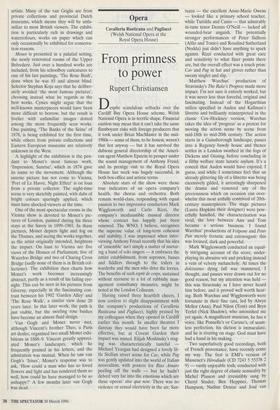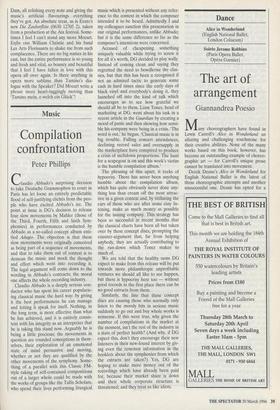Opera
Cavalleria Rusticana and Pagliacci (Welsh National Opera at the Royal Opera House)
From primness to power
Rupert Christiansen
Despite scandalous setbacks over the Cardiff Bay Opera House scheme, Welsh National Opera is in terrific shape. Financial caution may mean that it can't take the same flamboyant risks with foreign producers that it took under Brian MacMaster in the mid- 1980s — some of them, to be honest, weren't that hot anyway — but it has survived the dubious general directorship of the Ameri- can agent Matthew Epstein to prosper under the sound management of Anthony Freud, and its prestige visit to the Royal Opera House last week was hugely successful, in both box-office and artistic terms.
Absolute stars of the show were those true indicators of an opera company's health, the chorus and orchestra. Both remain world-class, responding with equal passion to two impressive conductors Mark Wigglesworth and Carlo Rizzi, the company's inexhaustible musical director whose contract has happily just been renewed. The WNO, I believe, recognises the supreme value of long-term cohesion and stability; I was impressed when inter- viewing Anthony Freud recently that his idea of 'ensemble' isn't simply a matter of nurtur- ing a band of solo singers — it embraces the entire establishment, from sopranos, basses and fiddlers through to the toilers in wardrobe and the men who drive the lorries. The benefits of such esprit de corps, sustained without recourse to a lot of rubbishy man- agement consultancy measures, might be noted at the London Coliseum.
Having raised three heartfelt cheers, I now confess to slight disappointment with the company's productions of Cavalleria Rusticana and Pagliacci, highly praised by my colleagues when they opened in Cardiff earlier this month. In smaller theatres I daresay they would have been far more effective, but at Covent Garden their impact was muted. Elijah Moshinsky's stag- ing was characteristically tasteful — Michael Yeargan had designed a lovely lit- tle Sicilian street scene for Cav, while Pag was gently updated into the world of Italian neorealism, with posters for Riso Amaro peeling off the walls — but he hadn't delved very far into the emotions which are these operas' sine qua non. There was no violence or sexual electricity in the air; San- tuzza — the excellent Anne-Marie Owens — looked like a primary school teacher, while Turiddu and Canio — that admirably in-tune tenor Dennis O'Neill — lacked all wounded-bear anguish. The potentially stronger performances of Peter Sidhom (Alfio and Tonio) and Rosalind Sutherland (Nedda) just didn't have anything to spark against. Rizzi conducted with great care and sensitivity to what finer points there are, but the overall effect was a touch prim: Cav and Pag in hat and gloves rather than sweaty singlet and slip.
Matthew Warchus' production of Stravinsky's The Rake's Progress made more impact. I'm not sure it entirely worked, but it was never less than forceful, original and fascinating. Instead of the Hogarthian milieu specified in Auden and Kallman's libretto and brilliantly reinterpreted in the classic Cox-Hockney version, Warchus takes the idea of 'progress' as a pretext for moving the action scene by scene from mid-18th to mid-20th century. The action starts in a Gainsborough landscape, passes into a Regency bawdy house and thence settles in a London swathed in the fogs of Dickens and Gissing, before concluding in a filthy welfare state lunatic asylum. It's a conceit that Auden would have enjoyed, I guess, and while I sometimes feel that an already glittering lily of a libretto was being excessively gilded, it arrestingly sharpened the drama and removed any of the preciousness which on occasion can over- whelm this most artfully contrived of 20th- century masterpieces. The stage pictures (Laura Hopkins their designer) were pow- erfully handled, the characterisation was vivid, the love between Ann and Tom became a serious business. I found Warchus' productions of Volpone and Peter Pan merely frenetic and extravagant: this was focused, dark and powerful.
Mark Wigglesworth conducted an equal- ly intriguing account of the score, under- playing its abrasive wit and pricking instead a vein of velvety melancholy. At times the dolcissimo dying fall was mannered, I thought, and pauses were drawn out for no good reason, but my attention was held — this was Stravinsky as I have never heard him before, and it proved well worth hear- ing. Both Warchus and Wigglesworth were fortunate in their fine cast, led by Alwyn Mellor (Ann), Paul Nilon (Tom) and Bryn Terfel (Nick Shadow), who astonished me yet again. A magnificent musician, he has a voice, like Ponselle's or Caruso's, of seam- less perfection, his diction is immaculate, and he is riveting on stage. God must have had a hand in his making.
Two superlatively good recordings, both of French provenance, have recently come my way. The first is EMI's version of Massenet's Herodiade (CD 7243 5 55378 2 9) — vastly enjoyable tosh, conducted with just the right degree of elastic sensuality by Michel Plasson and irresistibly sung by Cheryl Studer, Ben Heppner, Thomas Hampson, Nadine Denize and Jose van Dam, all relishing every note and giving the music's artificial flavourings everything they've got. An absolute treat, as is Erato's new Die Zaubetflote (0630 12705 2), taken from a production at the Aix festival. Some- times I feel I can't stand any more Mozart. Enfin vint William Christie and his band Les Arts Florissants to shake me from such complacence. There are no big names in his cast, but the entire performance is so young and fresh and vital, so bouncy and beautiful that I feel I have fallen in love with this opera all over again. Is there anything in opera more sublime than Tamino's dia- logue with the Speaker? Did Mozart write a phrase more heart-tuggingly moving than `Tamino mein, o welch em n Gliick'?



























































 Previous page
Previous page